
HISTORY AND HISTORIANS
History
History is an honest search for truth,
Misrepresentation abounds in the most valuable works of historians.
No history can present us with the whole truth, but they are the parts as most nearly produce the effect of the whole.
The word 'history' comes to us from the sixth century Ionians; it was their name for achievement. It meant not telling a tale, but the search for knowledge and the truth. It was not until Aristotle and more especially Polybius that it came to be applied to the literary product of the inquiry which precedes it. Aristotle described history as an account of what individual human beings have done and suffered.
History is an interpretation of the past in terms of the demands of the present. History is the disordered mass of truth and falsehood. It is idle to try to stay the wheels of history (a metaphor). It is futile to defy the force of history or 'put the clock back' or 'restore the past.' History is a river of time, the stream of history. It is a moving stair on which we are borne. It draws attention to those necessary conditions we could easily overlook. History raises and attempts to answer two important questions:(1) What was life like for men and women in the past ages?
(2) What impact did the past have on the present? (3) Those who desire an exact knowledge of the past as an aid to understanding the future, should remember that because human beings are involved, it may resemble it but not reflect it. History is the sum of innumerable biographies. Carlyle History is the applied utilization of documents - primary sources are at the heart of the history enterprise. History is every echo of the past. History is creative elaboration, the creative pursuit of menaing in the past. At the heart of the historical enterprise is the process of interpretation and debate. History is our interpretation of and opinion about human affairs in the past. Our object is to know and understand the past in which we may be interested for its own sake or as the parent of the present. History fosters in us five invaluable lessons:
History should combine:
"Stormed at by shot and shell,
Flashed all their sabres bare.
O what a charge they made,
Into the valley of death
Rode the six hundred."
History is a cumulative process with one scholar advancing on the building blocks provided by another. In fact, with each revision (narrative version) it is presumed by some, that we know better or see more clearly the nature of the past. We are for ever inching our way closer to its truth? "Standing on the powerful shoulders of our illustrious predecessors," we are able both to advance "the quality" and "the 'truthfulness' of history" This continuous process of interaction between historians and their facts is an unending dialogue between the past and the present.
History's incurable subjectivity results from our ongoing interest in all new aspects of past events. Because of this fact, all history is contemporary history because our contemporary interests determine what we select for examination and consideration.
History should be above all else exact and serious, but at the same time it can be true and lively. . The lenses through which we look at the past have to be refocussed from generation to generation.. What seemed wisdom to our fathers is often folly to us. . Maintain interest by digressions and incidental matter thrown into the work. . Character and chance at grips with destiny.. While the best history has enduring elements, there is a sense in which every generation has to have history re-written anew. In this fact lies much of the fascination which history will always offer thoughtful people."History ferrets out facts and establishes meaningful order out of the chaos of materials. The difficulty in writing history is not the poverty but the profusion of materials."
"History is merely the applied utilization of documents," for history is after all done with documents. Primary sources are at the heart of the historical enterprise. This definition should be qualified in these two ways. First: the "applied utilization" far from being just objective and a naturally imposed process, is one of also of creativity and interpretation. Interpretation and debate are at the heart of the historical enterprise. Second, "document" must be understood in the broad sense to mean not just written text, but every echo of the past - written, oral, physical and mental.
What matters is an acute sensitivity to the remembrance of things past. Ancient societies were insatiable consumers of their own heritage. Greece and Rome made sense of their place in the world and justified it to themselves by remembering and by insisting on the unifying relationship between the present and what had gone before.
Historian
As reason is the glory of man, so the lamp of reason is eloquence. Cicero
"To historians is granted a talent that even gods are denied - to alter what has already happened." David Irving
"Ignorance is the first requisite of the historian - ignorance which simplifies and clarifies, which selects and omits with placid perfection unattainable at the highest art." Lytton Strachey
"History is too serious to be left to historians." Iain MacLeod
British Politician & Historian
"Imitating the bees which laboriously gather their honey from every flower, I collected with discretion material proper for a true history." Vergil
"The purpose of writing is to narrate, not to prove." Quintilian
"The Historian is the prophet looking backwards." Frederick Schlegel
"In order to be a good historian, it is necessary to have no religion, no country, no profession and no party." Horace Walpole
If a historian adheres to original documents, she/he will never stray far from Real History. David Irving
"The best historian combines knowledge of the evidence with the highest intellect, warmest human sympathy and highest imaginative powers to enable the historian to understand the evidence accumulated." George Macaulay Trevelyan
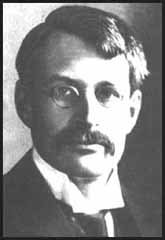 |
|
George Macaulay Trevelyan |
"There is no verdict of history other than the private opinion of the individual who wrote it." George Macaulay Trevelyan
"Man and above all the historian is full of vanity. He gives fine scope to his imagination and tries to interest the reader at the expense of truth." Napoleon
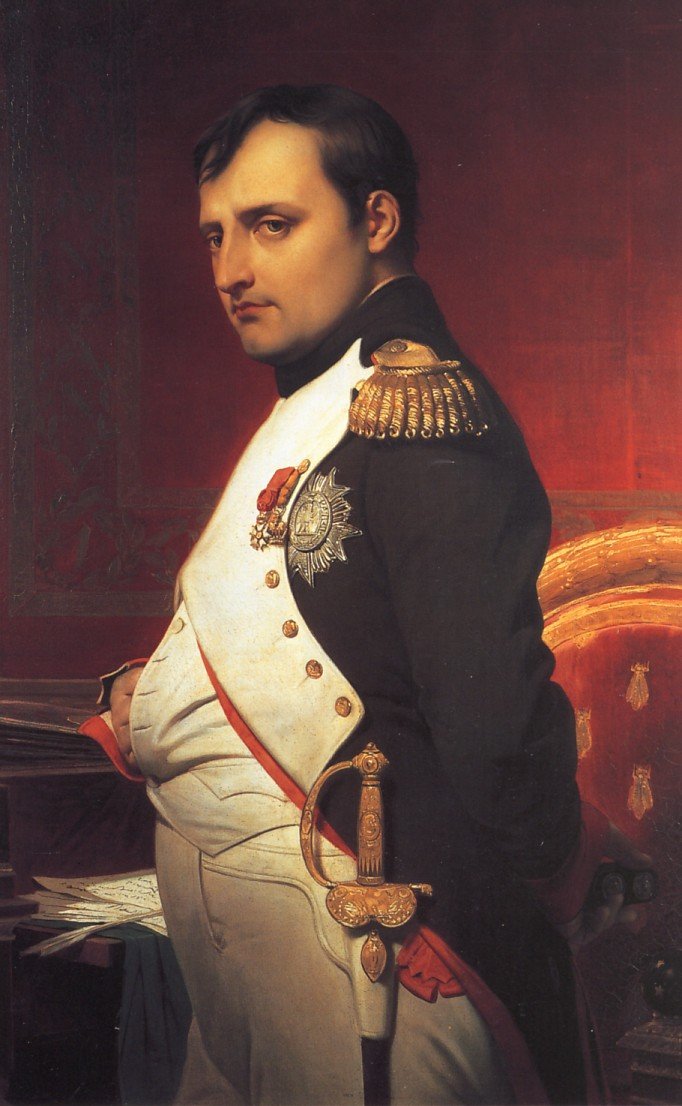 |
|
Napoleon |
Limitation and selection are essential for a historian's task.
The task of a historian is much like that of a restorer who carefully scrapes away layers of over-painting to reveal the original picture hidden beneath. The nearer she/he gets to the canvas, the closer he comes to truth. His/Her secret: to write narrative history, marshall hard facts and tell anecdotes to support big judgments.
It is not by the direct method of a scrupulous narration that the explorer of the past can hope to depict that singular epoch (any long period of history). If he is wise, he will attack his subject in unexpected places; he will fall upon the flank or the rear; he will shoot a sudden, revealing searchlight into obscure recesses hitherto undivided. He will row over that great ocean of material and lower down into it, here and there a bucket which will bring up to the light of day, some characteristic specimen from those far depths to be examined with careful curiosity. Lytton Strachey
The Historian, the guardian and interpreter of the past's treasure trove of human experiences, seeks to find out what really happened. This involves two functions:
"To historians is granted a talent that even the gods are denied: to alter what has already happened!"
Interpretation of the historical record by the historian must involve making choices not only about the context but also the meaning of historical events. Whether this neutral and objective role of analyst - someone who looks dispassionately at the evidence and presents one's findings - is ever actually possible is debatable given the choices that every historian must make and how he or she sets about analysing something.
The roles of analyst and judge are not mutually exclusive. The historian does not pick only one of these 'hats' to wear; they overlap and shift and involved two other roles every historian, in one way or another, must play. First as synthesizer, she/he brings together a variety of things (pieces of evidence, ideas, other historians' works) and forges them into a new pattern. This involves making choices - what to include; what to leave out; what to emphasize' what to downplay - choices that are unavoidable. The role of synthesizer is essential for without it there would be no 'history' as we understand it - only stacks and stackes of records, lacking shape or coherence.
Finally, every historian is a story teller who makes the synthesis available to a wider audience. The 'history' is the final production (after the historian has completed all his or her other roles), and it is necessarily a kind of narrative, a story, as soon as the historian starts to analyse and explain. As readers we are led from a beginning to a middle to an end. Unless the historian has cheated or been lazy or sloppy, the story is true to its sources. However, the tale told could be different had the historian adopted a different role.
The diligent historian is like a dedicated dog that cannot refrain from bringing things to the attention of the public, things which some may prefer are better left buried.
Historians should be neither cheerleaders of history's victors, nor advocates for history's vanquished.
No one historian can possibly see more than a fraction of the truth. If he/she sees all sides, he/she probably cannot see very deeply.
A historian's task is akin to that of a painter, not a photographer in that he must single out and stress that which is the nature of the thing.
Herodotus of Halicarnassus (484-420 B.C.) who is commonly called the Father of HistoryHis more chauvinistic compatriots called him the Father of Lies because of his interest in foreign lands.
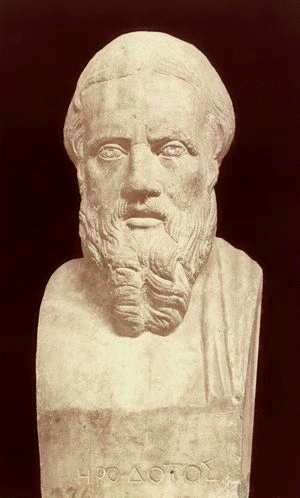 |
|
Herodotus |
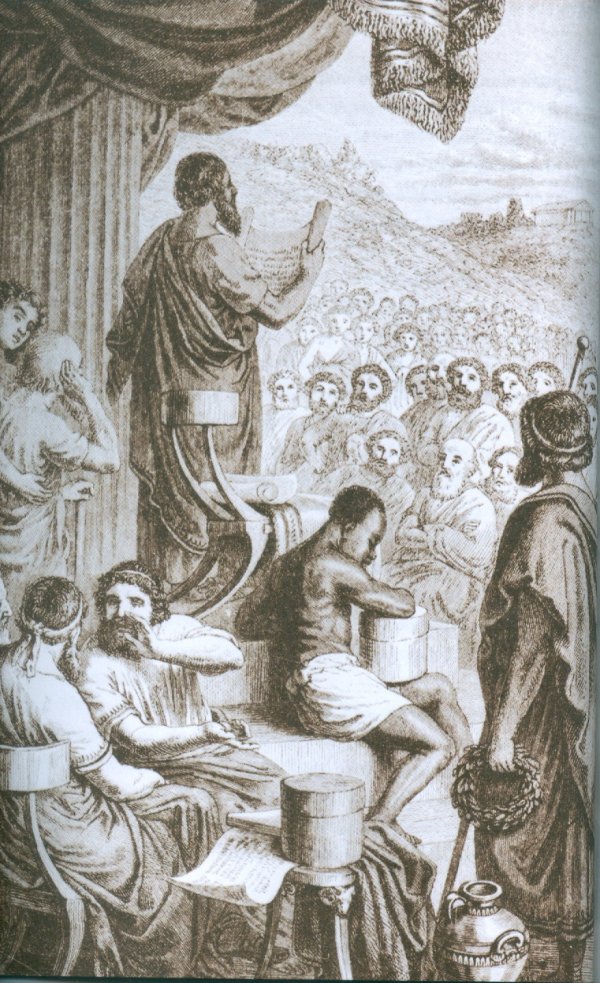 |
|
Herodotus reciting his histories to an audience. |
Thucydides (455-c.401 B.C.) "the most Politick Historiographer that ever writ."
He introduced systematic analysis of causation and consequence; quoted documents and treatises at length; and in set-piece orations of his principal protagonists, he found a marvellous method for injecting his strictly impartial narrative with subjective opinion.
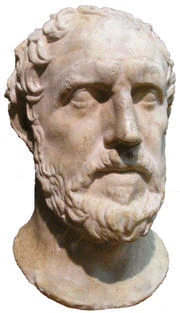 |
|
Thucidides |
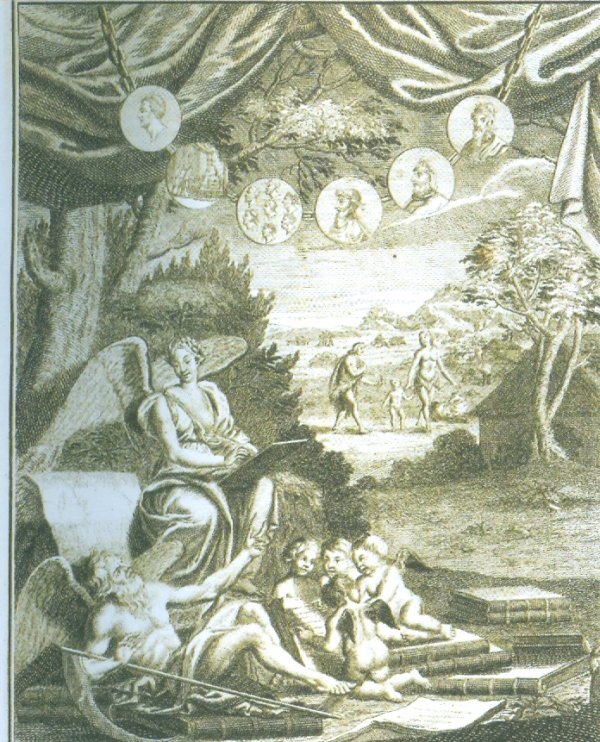 |
|
Clio |
Copyright © 2013 Website Administrator
What is History?
Why Learn History?
History & Historians
Aim
Curriculum Connections
Curriculum Data
Historical Thinking